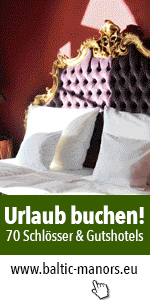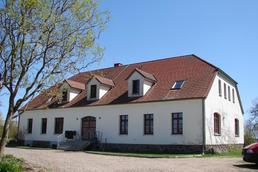Manor House Dishley near Friedland
Originally the place was called Treppersdorf. At the end of the 18th century it received the name Dishley at the suggestion of Regierungsrat (senior civil servant) August Schlettwein in memory of his prolonged stay in England and an economic plan.
Dishley Grange in Leicestershire was the home of the famous Robert Bakewell (1725-1795) a British agriculturalist who was the first to implement systematic selective breeding of livestock. His findings led to specific improvements in sheep, cattle and horses.
In 1783 Schlettwein´s wife and her sister had acquired the estates of Beseritz and Dahlen for the price of 86.000 Taler. Schlettwein´s sister-in-law ceded her share to the Regierungsrat and his wife in 1793. These two reconstructed the grange. Also erected, towards the end of the 18th century, was the single-storey manor house with its half-hipped roof.
After both their death the inheritance went to their daughter. In 1806 the widow Hellwig, who hitherto had been the tenant of Pleetz, bought the estate Dahlen with Dishley. In 1817 the possession came to Baron von Langermann - Erlenkamp. Later Dishley went to the younger Hellwig daughter as an inheritance. She married the future Mecklenburg-Strelitz Amtsrat Nauck (administration superior). Until 1879 Dishley remained in the hands of the Nauck family. Afterwards the estate changed owners several times: in 1884 one Bernhard Brauer was the occupant, in 1900 one Wilhelm Sagert. In 1926 the property belonged to Arthur Hoffmann.
As so many other estates Dishley was also divided out in the course of the land reform. After 1945 the manor house served as accommodation for many homeless refugees. Later it became municipal property and was in use for residential purposes until 1993.
From the mid 1950ties on until 1992 a co-operative shop was located in the manor house as was a post office from 1956 up to 1982. The former salon was in use as a village social club.
After the political change the house stood empty for a few years. In 1997 it was sold by the municipality of Schwanbeck. First reconstruction work started in 2000 commissioned by the Diakonieverein des Kirchenkreises Stargard, a social welfare association of the church circle Stargard. In 2001 the first therapeutic facility for drug addicted children and adolescents was opened here.


